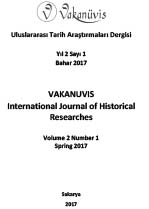The Ethno-Linguistic Aspects of the Birth and the Death Rituals in Balkan Linguistics Context
The Ethno-Linguistic Aspects of the Birth and the Death Rituals in Balkan Linguistics Context
Author(s): Mustafa BukurijeSubject(s): History, Language and Literature Studies, Cultural history, Customs / Folklore, Lexis, Cultural Anthropology / Ethnology, Culture and social structure
Published by: Serkan YAZICI
Keywords: word; culture; cultural-lexeme; ethno-culture; ethno-linguistic;
Summary/Abstract: The Balkan people, no matter how different they are, have been going through a historical and cultural cohesion, which is reflected in their linguistic identities, known as the Balkan concourse, defined within the geographical area. Starting from the premise that the word is the bearer of meaning, within its historical context concurrently the cultural complements the information. In this context, the well known Albanian linguist Eqrem Çabej in “Studime gjuhësore I” (Language Studies I), defines the word as history and he says: "history of language is a cultural history" or "history of words is the history of culture". Meanwhile, Elena Uzejnova in her ethnolinguistic studies of Slavic languages, treats lexemes not only as carriers of information denominator, but also entire cultural contexts of their functions.All this serves as the basis of the ethno-cultural and linguistic survey of the cycles of life, birth and death, leaving aside the marital or folk calendar. Çabej considers that such ethnological issues are “remnants of old pagan times, who have dressed during the time the Christian clothes and later Islamic clothes, maintaining through this metamorphosis”. The term “childbirth”, does not only giveinformation about women, but it also tells about a social function which is formalized as a general idea. In the Albanian language, the world for ‘pregnant’ is e rëndë (heavy), which is also used in other languages; Serbo-Croatian: bremena; Bulgarian: бременна; Macedonian тешка; Romany: phari. The Turks of Macedonia used gebe kadın / pregnant woman, while those of Turkey used hamile, coming from Arabic language which means “heavy”.Equally interesting are expressions which are used in folk idioms for death as a natural and deep religious process.
Journal: Vakanüvis- Uluslararası Tarih Araştırmaları Dergisi
- Issue Year: 2/2017
- Issue No: 1
- Page Range: 32-45
- Page Count: 14
- Language: English

